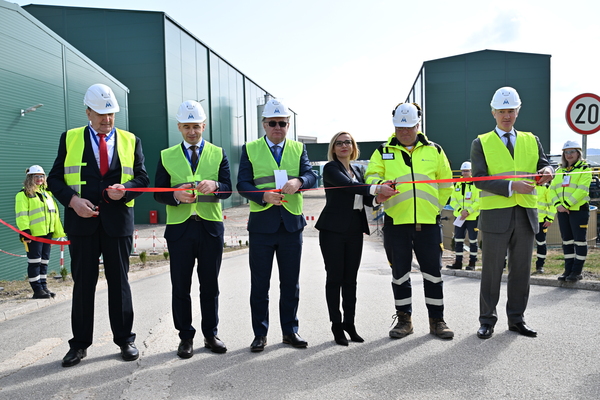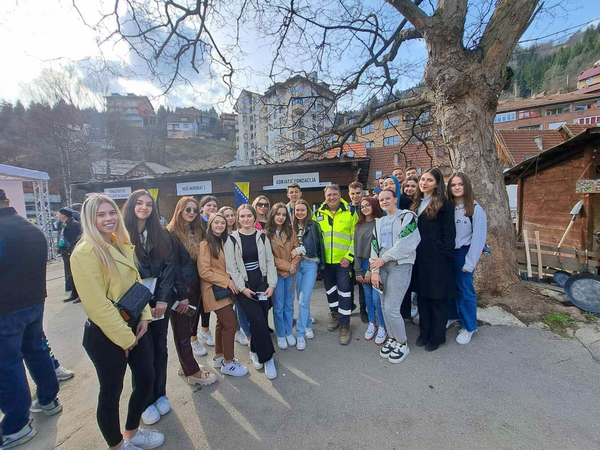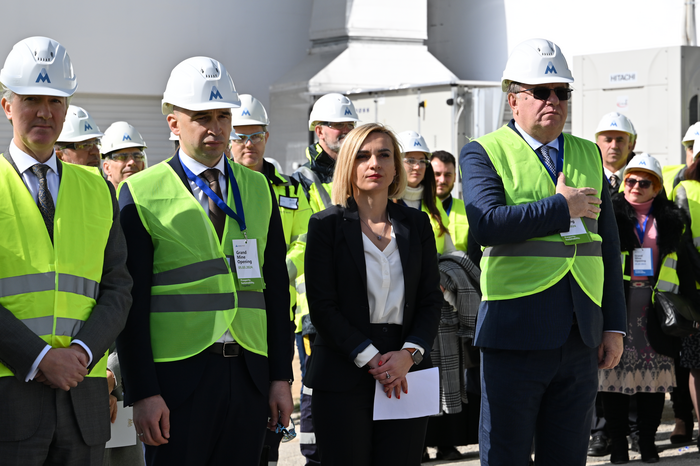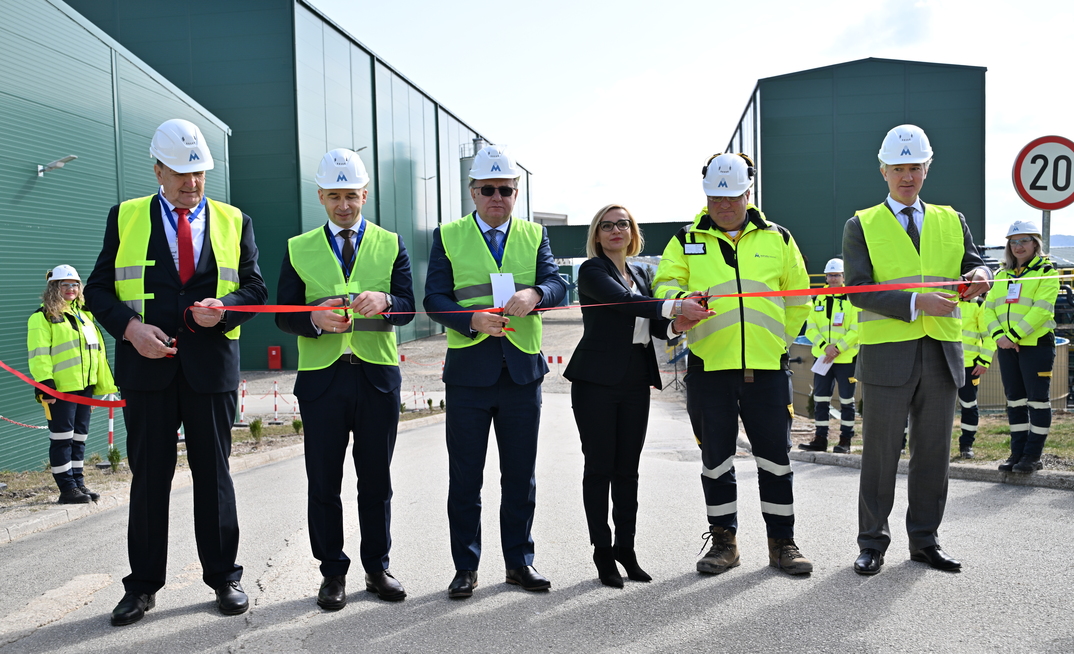This week, Adriatic Metals opened its Vareš processing plant, which brought together workers - largely inhabitants of the local area in Bosnia and Herzegovina (BiH) - and politicians to celebrate the first European mine opening in ten years and the first large-scale investment in BiH since the war in the early 1990s.
The road to Vareš is decorated with the blue and yellow BiH flag alongside the Adriatic Metals flag, which is displayed at insistance of the Mayor of Vareš, a sign of the importance of the 800,000tpa polymetallic mine on the local community.
"To the company, it's huge," chief executive Paul Cronin says of the opening. "It's the combination of six years of work. A lot of risk, a lot of investment, a lot of frustration."

In numbers, the importance of the project to the region is clear. The Rupice mine and Vareš processing plant amount to an investment of $250m. In 2023 Adriatic contributed something like 22% of foreign direct investment into Bosnia and 2% of GDP.
Adriatic has also sourced domestic suppliers to Vares - 69% of total capital spend is deployed domestically, the equivalent of $155 million across 739 companies.
It will pay approximately $177m in corporate tax and social contribution payments over the life of the mine (LOM) and around $23m in direct royalty payments to the government.
The impact on not just the local population, but further afield cannot be overstated. Adriatic has built a state-of-the-art modern mine and plant in the middle of BiH to the highest environmental standards.
However, mining is not new to the area. We are reminded of this time and again by the scars in the landscape and in the speeches by dignitaries on the day, who point to the 1992-1995 war as driving away investment for more than two decades.
Local impact
"40 years ago Vareš was home to the most capable, the most competent engineers, geologists and metallurgists in Europe," Adriatic Metals board member Sanela Karic explains during the opening ceremony.
"And while these hills around Vareš have always held the key to our industrial prosperity, unfortunately, the competence that we once had has diminished as the best professional people started to leave our country. I feel great pride looking at this project because I know what it can offer this country," she added.
It is also constantly repeated that if it wasn't for the mine opening, Vareš would have remained "the place at the end of the train line". Once a bustling mining town of 25,000, the population now is closer to 5,000.
Adriatic has moved to integrate itself into the local area. "When we first went about and went to the community and got the feedback from what was needed, the number one priority was opportunities for their children," Cronin tells Mining Journal.
It's a different place now. The Vareš of 2016, when Cronin first set foot there, was a town where the average age was 64, "There were no restaurants, no hotels. It was really quite dire; I see the change. They are out shopping - they're growing."
As of January 2024, Adriatic has 255 employees, of which 73% come from Zenica-Doboj Canton, the area in which Vareš is situated.
Adriatic essentially kickstarted a human development program, Cronin explains. It started to hire young, to work with universities and schools. It runs an internship with universities across Bosnia, Croatia and Slovenia.
It also runs a high school course where students can learn about mining in technical college. In the first year the company ran the course it had three students, now, three years on, the intake is at 19.
"We are three years in from doing the programme and it has started to work," Cronin says.
"There are a lot of deposits up there that are going to be found and it's my hope that some of the people that we've trained will go off and start their own exploration companies," he added.
Adriatic Metals also set up the Adriatic Foundation, an independent body which support and promotes local sustainable socio-economic development. Part of this sees scholarships being awarded to local children.

"Being part of the scholarship means I will have more opportunities," the children tell me. "It makes us so proud."
Rupice and Vareš
The week before the opening ceremony the company successfully processed first concentrate from the plant (see video).
The project will continue to ramp up over the year, targeting nameplate processing capacity of 65,000tpm by the fourth quarter of 2024.
In December 2023 Adriatic delivered a significant boost to its 2021 reserves and the planned mine life, with growth at the main Rupice deposit and the addition of the first numbers from the Rupice Northwest deposit.
Rupice's reserves are up 89% since mid-2021 for a contained 83M oz silver, 723,000t zinc, 457,000t lead, 640,000oz gold, 64,000t copper and 24,000t antimony.
An updated resource for Rupice and Rupice Northwest is expected in H1 2024.
A host for foreign investment
"The reality is the benefit of [the Vareš project] will far outweigh or last far longer than the mine life; If we can do it properly if we can show people that there is an industry here (…)" Cronin told Mining Journal.
"Our company and this mine have shown the world that our country can be a good host for foreign investment," board member Sanela Karic emphasised.
"We are showing that successful investment is possible in the Federation of Bosnia and Herzegovina, and beyond," Nermin Nikšić, Prime Minister of the Federation of Bosnia and Herzegovina, echoed at the opening.
"This is not only the beginning of work for Adriatic Metals and the beginning of production, but also a signal to all future investors that Bosnia and Herzegovina is open to investment," he added.

Hazim Hrvatovic, from the Bosnia Geological Survey, accompanied Cronin on his first trip to Vareš. He was contacted by the Australian who asked if he could show him where to collect soil samples.
"I was happy to do it," the old man remembers, "it was a bit of hope, a chance. He came up here, and we talked, and then we spent time with my son".
And how does the geologist, now retired, feel seeing the plant opening, the concentrate production? "It's more than I could have imagined," he laughs.
Employment
In terms of diversity, 27% of employees of Adriatic Metals are women, surpassing the global mining workforce average of 15% (according to a 2020 World Bank report), and significantly exceeding the approximately 10% representation in Bosnia and Herzegovina.
It is still illegal for women to work underground in Bosnia, which means that the proportion of women at Rupice is lower than that working at the plant.
European challenges
"Opening a modern mine anywhere in the world is a challenge, but to do it in only seven years is a massive achievement," Julian Reilly, UK Ambassador to BIH, told Mining Journal.
"No one has put a new mine in production in Europe for over a decade and there's a reason for it. You've got to get the social licence. And I think the other reason was financing. We knew it would be much easier to finance if we implemented EBRD (European Bank for Reconstruction and Development) principles- In fact, EBRD become the shell," Cronin said.
As well as this their equity investors held them to a high standard, Cronin explains.
"The Orion mine finance have held us to those standards," he told Mining Journal. "We will continue to hold on to those standards. A lot of our equity investors are very interested in in our sustainability and governance approaches. And to have the support in the international community here, which we need, we have to demonstrate that we're doing things really well."
"As an equity shareholder we said that it needed to follow the EBRD, that was clear from the beginning," Manuela NaessI, head of EBRD BiH, said. "Paul [Cronin] wanted to show that he was following it, he led the initiative," she added.
Markets
However a look at the commodity markets shows that while the will and political support is there for the mine, market prices remain low for zinc.
LME prices are up marginally (closing at $2,457.5/t (cash)), but levels are still a way down from a year ago and even more so from the peak of 2022 when zinc prices reached $4500/t.
Swedish zinc producer Boliden has agreed to purchase zinc concentrate from the Adriatic project, saying that they wanted to source concentrate from a project with a low carbon footprint.
"Boliden and Adriatic Metals will cooperate in producing zinc and other valuable metals according to the highest ESG standards," the two companies said in a join release in October.
"Zinc prices have been low for about a year from where we did the study, but we are 50% base, 50% precious metals, So we do have a balance," Cronin said.
"Zinc is affected by China and the perception that it is sinking into a hole, but we know its rubbish -
We are also seeing reinflation, and that makes people nervous," he added.
Silver prices remain strong, buoyed by an uptick in photovoltaic cell demand and in EVs, where silver is used as an electricity conductor for high-velocity charging.
"When we are up to capacity, that's when we will know. We are confident that we have got the plant and the people."
"I think if I look back in three or four years' time and probably feel pretty proud of what we've done, particularly in the long longer-term benefits," Cronin finishes.
























